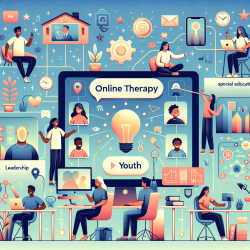Introduction
The COVID-19 pandemic has presented unprecedented challenges across various sectors, including education and healthcare. For practitioners providing online therapy services, such as those at TinyEYE, understanding the implications of past pandemics can offer valuable insights. The research article "Coping With COVID-19: Learning From Past Pandemics to Avoid Pitfalls and Panic" by Daniel T. Halperin provides a comprehensive analysis of the lessons learned from previous health crises and how they can be applied to current practices.
Key Insights from Past Pandemics
Halperin's research highlights several critical lessons from past pandemics, notably the AIDS epidemic, which can be applied to the current COVID-19 situation. One of the primary takeaways is the importance of identifying the main transmission routes of a virus to effectively mitigate its spread. For COVID-19, understanding that infection clusters often result from prolonged indoor respiratory exposure is crucial. This knowledge helps in developing targeted strategies to reduce illness and mortality.
Another significant lesson is the need to avoid generating irrational fear and maintaining a broader perspective. During the AIDS epidemic, fear and misinformation led to stigmatization and panic, which hindered effective response efforts. Similarly, with COVID-19, it is essential to communicate clear, evidence-based information to prevent unnecessary anxiety and focus on realistic behavioral changes.
Implications for Online Therapy Practitioners
For online therapy practitioners, these insights can be instrumental in enhancing service delivery during the pandemic. Here are some practical applications:
- Clear Communication: Ensure that clients receive accurate information about COVID-19, focusing on evidence-based practices to manage anxiety and stress. This includes dispelling myths and providing reassurance about the effectiveness of online therapy.
- Adapting to Client Needs: Recognize that the pandemic may exacerbate existing mental health conditions or create new challenges for clients. Tailor therapy sessions to address these issues, incorporating strategies to cope with fear and uncertainty.
- Promoting Resilience: Encourage clients to build resilience by focusing on positive coping mechanisms and maintaining social connections, even in a virtual environment.
- Continuous Learning: Stay informed about the latest research and developments related to COVID-19. This ongoing education will enable practitioners to provide the most current and effective support to their clients.
Encouraging Further Research
While the insights from past pandemics are invaluable, it is crucial for practitioners to engage in continuous research to adapt to the evolving landscape of COVID-19. By staying updated on emerging data and participating in professional development opportunities, therapists can enhance their skills and improve client outcomes.
Practitioners are encouraged to explore the full research article by Daniel T. Halperin for a more comprehensive understanding of the lessons from past pandemics. To read the original research paper, please follow this link: Coping With COVID-19: Learning From Past Pandemics to Avoid Pitfalls and Panic.
Conclusion
The COVID-19 pandemic continues to challenge the way we deliver therapy services. By learning from past pandemics and implementing evidence-based strategies, practitioners can navigate these challenges more effectively. Through clear communication, adaptability, and a commitment to ongoing research, online therapy providers like TinyEYE can continue to support their clients and improve outcomes during these uncertain times.










